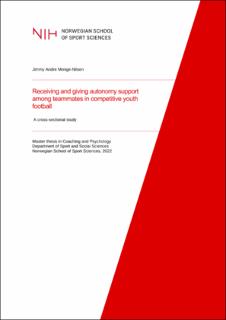Receiving and giving autonomy support among teammates in competitive youth football: A cross-sectional study
Master thesis
Permanent lenke
https://hdl.handle.net/11250/3017647Utgivelsesdato
2022Metadata
Vis full innførselSamlinger
Sammendrag
Youth competitive sports is a salient social arena for youth athletes to develop physically, technically, psychologically, and socially in fellowship. Still, there is insufficient empirical evidence of peer motivational climates. Therefore, the purpose of the present study was to explore potential explaining factors of peer motivational climates in competitive youth football using self-determination theory. We intended to investigate receiving and giving autonomy support to teammates and their associations with satisfaction and frustration of basic psychological needs in competitive youth football. In examining autonomy support, we included psychological factors such as self-esteem, resilience, perfectionism, benevolence, and trust to explore the antecedents of autonomy-supportive behaviour. Hence, a classification and regression tree (CRT) using the CHAID algorithm to investigate significant explaining factors for autonomy received and given. Accordingly, two trees were produced. Football players (N = 232, M = 17.5, SD = 1.15) in teams (U16-U19) from various Norwegian regions were recruited. The results indicated the intricate nature of autonomy support with essential differences in players’ experience of autonomy support received and reasons for giving autonomy support to teammates. Players’ received autonomy support from teammates was explained by their experience of relatedness. In contrast, players’ benevolence was the main factor explaining autonomy support given to teammates. Results indicated a more complex interplay concerning autonomy support given to teammates, with multiple factors contributing to the supporting behaviours towards teammates in competitive youth football.
Beskrivelse
Masteroppgave - Norges idrettshøgskole, 2022
